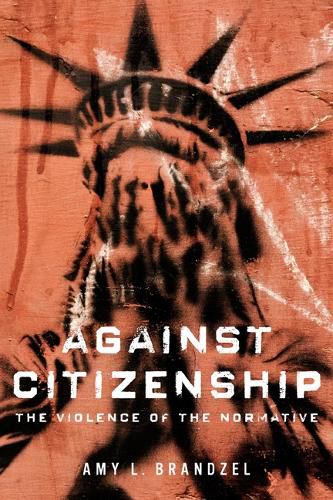Readings Newsletter
Become a Readings Member to make your shopping experience even easier.
Sign in or sign up for free!
You’re not far away from qualifying for FREE standard shipping within Australia
You’ve qualified for FREE standard shipping within Australia
The cart is loading…






Numerous activists and scholars have appealed for rights, inclusion, and justice in the name of citizenship. Against Citizenship provocatively shows that there is nothing redeemable about citizenship, nothing worth salvaging or sustaining in the name of community, practice, or belonging. According to Brandzel, citizenship is a violent dehumanizing mechanism that makes the comparative devaluing of human lives seem commonsensical, logical, and even necessary. Against Citizenship argues that whenever we work on behalf of citizenship, whenever we work towards including more types of peoples under its reign, we inevitably reify the violence of citizenship against nonnormative others. Brandzel’s focus on three legal case studies–same-sex marriage law, hate crime legislation, and Native Hawaiian sovereignty and racialization–exposes how citizenship confounds and obscures the mutual processes of settler colonialism, racism, sexism, and heterosexism. In this way, Brandzel argues that citizenship requires anti-intersectionality, that is, strategies that deny the mutuality and contingency of race, class, gender, sexuality and nation–and how, oftentimes, progressive left activists and scholars follow suit.
$9.00 standard shipping within Australia
FREE standard shipping within Australia for orders over $100.00
Express & International shipping calculated at checkout
Numerous activists and scholars have appealed for rights, inclusion, and justice in the name of citizenship. Against Citizenship provocatively shows that there is nothing redeemable about citizenship, nothing worth salvaging or sustaining in the name of community, practice, or belonging. According to Brandzel, citizenship is a violent dehumanizing mechanism that makes the comparative devaluing of human lives seem commonsensical, logical, and even necessary. Against Citizenship argues that whenever we work on behalf of citizenship, whenever we work towards including more types of peoples under its reign, we inevitably reify the violence of citizenship against nonnormative others. Brandzel’s focus on three legal case studies–same-sex marriage law, hate crime legislation, and Native Hawaiian sovereignty and racialization–exposes how citizenship confounds and obscures the mutual processes of settler colonialism, racism, sexism, and heterosexism. In this way, Brandzel argues that citizenship requires anti-intersectionality, that is, strategies that deny the mutuality and contingency of race, class, gender, sexuality and nation–and how, oftentimes, progressive left activists and scholars follow suit.